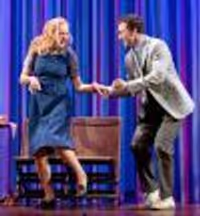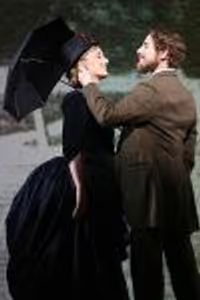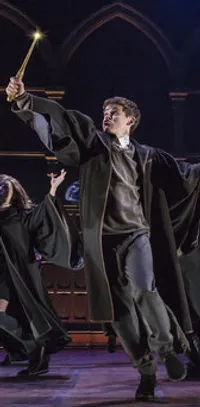Unknown Soldier - Playwrights Horizons
#1Unknown Soldier - Playwrights Horizons
Posted: 2/16/20 at 2:22pm
Michael Friedman and Daniel Goldstein’s Unknown Soldier at Playwrights Horizons started previews on Friday. Anyone else catch this? Saw first preview, my friend and I were blown away. Extremely emotional reactions. Found it intimate and personal, and profound in how it plays with the themes of time and choice. My favorite show of the new calendar year thus far.
Updated On: 2/16/20 at 02:22 PM#2Unknown Soldier - Playwrights Horizons
Posted: 2/16/20 at 2:41pmWow .... thanks for putting this on my radar.
Pashacar
Broadway Star Joined: 11/2/18
#3Unknown Soldier - Playwrights Horizons
Posted: 2/16/20 at 4:55pm
It has unbelievable reviews on show score so far. Glad to hear another good report.
I bought my tickets the day they went on sale but this seems to still have a very low profile. I wonder if they are eying a transfer at all.
#4Unknown Soldier - Playwrights Horizons
Posted: 2/16/20 at 5:21pmI really doubt they’re trying for a transfer. Too low profile and it’s just not very commercial. But absolutely see this run of it, it’s not to be missed.
spicemonkey
Broadway Star Joined: 6/3/18
#5Unknown Soldier - Playwrights Horizons
Posted: 2/16/20 at 6:51pm
Finally we have a thread about this one. Thank you!
I already bought my ticket a while ago. I'm excited to see Kerstin Anderson again after MFL.
#6Unknown Soldier - Playwrights Horizons
Posted: 2/16/20 at 8:37pm
What's the runtime on this?
Seeing in a few weeks—my curiosity is piqued.
#7Unknown Soldier - Playwrights Horizons
Posted: 2/16/20 at 9:54pmIt’s 90 minutes according to the PH site. Looking forward to this.
#8Unknown Soldier - Playwrights Horizons
Posted: 2/16/20 at 10:49pmIt is indeed 90 minutes, and it’s gorgeous. Margot Seibert gives a particularly lovely performance, but the whole cast is flawless. Given that it’s very early in previews, I’m particularly impressed. It doesn’t scream for a more commercial run, but it’s wonderfully done. I didn’t know what to expect, knowing Friedman mostly just from Bloody Bloody, but this is lyrical, wistful, and romantic.
After Eight
Broadway Legend Joined: 6/5/09
#9Unknown Soldier - Playwrights Horizons
Posted: 2/16/20 at 11:04pm
A dud.
Uninteresting characters, story, music.
Estelle Parsons succeeded in getting a laugh.
The one flicker of life in this dull and dreary enterprise.
InTheBathroom1
Broadway Star Joined: 10/6/18
#10Unknown Soldier - Playwrights Horizons
Posted: 2/16/20 at 11:41pmAfter Eight hates a show. Everyone take a shot
A Director
Broadway Legend Joined: 12/18/07
#11Unknown Soldier - Playwrights Horizons
Posted: 2/17/20 at 12:31am
After Eight said: "A dud.
Uninteresting characters, story, music.
Estelle Parsons succeeded in gettinga laugh.
The one flickerof life in this dull and dreary enterprise."
You must be counting the days until Plaza Suite arrive back in town. It's just your style.
theaterdarling
Stand-by Joined: 9/4/17
#12Unknown Soldier - Playwrights Horizons
Posted: 2/17/20 at 7:50pm
You can have at AfterEight but I have to say UNKNOWN SOLDIER did not work for me either. One poster implied that in not liking SOLDIER, AfterEight’s tastes must thus run to PLAZA SUITE. For the record, I saw the current Boston production of SUITE and disliked it—so, news alert, there is no correlation.
Saw this at the 2/16 matiness. Since it is usually of everyone’s primary concern, I’ll announce upfront that there is no intermission.
I love darker, moody, broody musicals, they are among my favorites, however, fusing together a more contemporary, angsty story line with period piece flashbacks that seem more Hallmark Channel was way too askew. The tonal and stylistic variances did not synch for me. I sometimes felt I was watching an awkward mash up of NEXT TO NORMAL and RAGTIME
The WW1 era scenes were just not as involving to me as the more emotionally honest, contemporary scenes--they were instead so musically and dramatically overwrought. I was expecting something a lot less obvious from these scenes given the writing/directing talent involved. Hard to avoid certain dramatic tropes involving damaged WW1 soldiers returning home, it just seemed I had seen this melodrama before, even with the overlay of young Lucy's psychological struggles. Even the use of the the lighter music hall/vaudeville style music for one song (or possibly two-can’t recall) along with attendant choreography seemed a little tired, though certainly appropriate to the time-period.
I was so much more interested in the scenes set in the present (Older Ellen/Researcher) or closer to present day (Older Lucy/Younger Ellen). Thought the conversational style of the music and psychological explorations undertaken including how the emotional/psychic past informs emotional/psychic present etc. was much more successful, although the music was still not particularly memorable.
I did admire most of the performances. Young Zoe Glick is scene stealer. This was my first introduction to Margo Seibert and I look forward to seeing her again- in anything. Such an arresting, but grounded presence while on an emotional slide completely devoid of histrionics. Erik Lochtefeld is very affecting as the sad sack researcher, but his arc eventually has a bit of an ick factor and his resolve seems tacked on. My big problem with Kerstin Anderson’s younger Lucy was the already noted overemotive nature of her scenes/songs, but if that was what asked for-- not her fault. Perry Sherman, as the unknown soldier, seemed so frustratingly one-dimensional with his rather predictable hollow eyes and fixed gaze.
The great Estelle Parsons was vastly underutilized. Would have loved to have seen much more of her wounded character dealing directly with young Ellen (and even the older Ellen) without being interrupted by they way too many flashbacks of her younger self with and without the unknown soldier. That, to me, is where the show should have been dramatically, with Parson's Older Lucy carrying more of the load, counter balancing the story lines of the Ellens. I would have preferred to see Lucy’s life, even her younger life, through Parson's more interesting and evocative eyes. I don't think I actually needed to see so much actual dramatizing of her involvement with soldier in order appreciate this formidable ghost from her past. With so much dramatic real estate wrongly apportioned to seeing young Lucy with the unknown soldier, I'm surprised, to the other extreme, one important character in this multi generational tale is never seen. That omission was so glaring to me.
I am aware that further developing this show and mounting a production in New York was the proverbial labor of love by Goldstein and Cullman given Friedman’s recent passing. I wish I could say I liked their labors more.
#13Unknown Soldier - Playwrights Horizons
Posted: 2/18/20 at 11:45am
I saw it this past weekend, and enjoyed it overall, with some reservations that I haven't entirely pinpointed yet.
The music is beautiful, and the story is right up my alley in terms of the kinds of things that really move me. And in many ways I think the show is well-constructed and effective overall. There are deep emotions at play, and I did find myself moved by the ending, but maybe not as much I could have been.
My main technical criticism was that I didn't care for a lot the overly descriptive, rambling lyrics. And from a broader, storytelling standpoint, I don't think I cared enough about Ellen's story line. I felt invested in her search for information on her grandmother, but not so much for her romantic drama with the researcher guy, or her unseen husband.
I think I would like this show more upon a 2nd viewing, but unfortunately I doubt I'll get around to it. It's something that I would recommend to people who follow the world of serious musical theatre, and it's certainly a lot better than the garbage that's been passing for musical theatre in recent years (though I actually think we've been seeing a bit of an upsurge this season, and toward the end of last season)
#14Unknown Soldier - Playwrights Horizons
Posted: 2/18/20 at 1:46pm
theaterdarling said: "With so much dramatic real estate wrongly apportioned to seeing young Lucy with the unknown soldier, I'm surprised, to the other extreme, one important character in this multi generational tale is never seen. That omission was so glaring to me."
I'm so, so curious who you mean by this, theaterdarling, but for spoilerish reasons don't know how to phrase the question. I can't seem to send a PM, but if you can to me, I'm legitimately super curious because there's a plot point that I'm not sure whether I missed or whether it was intentionally vague, and I'm wondering if it might be about the same thing. (Cryptic, I know--apologies)
theaterdarling
Stand-by Joined: 9/4/17
#15Unknown Soldier - Playwrights Horizons
Posted: 2/18/20 at 5:42pm
Sauja said: "theaterdarling said: "With so much dramatic real estate wrongly apportioned to seeing young Lucy with the unknown soldier, I'm surprised, to the other extreme, one important character in this multi generational tale is never seen. That omission was so glaring to me."
I'm so, so curious who you mean by this, theaterdarling, but for spoilerish reasons don't know how to phrase the question. I can't seem to send a PM, but if you can to me, I'm legitimately super curious because there's a plot point that I'm not sure whether I missed or whether it was intentionally vague, and I'm wondering if it might be about the same thing. (Cryptic, I know--apologies)
"
just pm'd you
#16Unknown Soldier - Playwrights Horizons
Posted: 2/19/20 at 12:18pm
UNKOWN SOLDIER up this weekend on TDF 2/20 - 2/23
wolfwriter
Featured Actor Joined: 3/16/15
#17Unknown Soldier - Playwrights Horizons
Posted: 2/23/20 at 11:25am
Caught this last night and highly recommend it
This is a deceptively simple, multi-layered exploration of how we re-write our stories, intentionally or not, in an attempt to make the present and the future more “acceptable.”
This is probably not a musical for everyone and I can easily understand why After Eight hated it. You, as the audience, have a lot of work to do. And, it’s not always the most pleasant work. Memory, often isn’t. You won’t leave humming the tunes or wanting the cast recording, but the beautiful music fits the story and works really well.
As for being invested in the more recent scenes as opposed to the WWI scenes, I felt exactly the opposite. I’m always fascinated that, while situations of 100 years ago were radically different, how our memories and personal histories are "altered," doesn’t change.
I don’t know what character is unseen that needs to be, as another poster stated.
Margo Seibert, so good in Octet, Rocky and other performances, is excellent as the woman trying to sort out her past and her present. Kerstin Anderson has a lovely voice and conveys a lot of emotional range. In fact, the entire cast is excellent.
And, is there anything Estelle Parsons can’t do? This is a master class in taking a small role and making the part as touching, important and meaningful as it is. Wasted, she is not. I pray I’m half as capable when I’m 92.
This is a lovely show that has a universality in its intimacy. This is everyone’s story of how those in your orbit (past and present), play with their memories and re-write their stories (and maybe yours, as well).
#18Unknown Soldier - Playwrights Horizons
Posted: 2/23/20 at 9:58pm
Chiming in to say this is easily one of the best new musicals I’ve seen in NYC in a while. It’s first-class on every level, and I was truly just blown away.
I would recommend going out of your way to see it. It was hard to believe I was sitting in a small off-broadway house watching it unfold, it is just so well done and presented it feels elevated. Would love to see what the future has in store for this.
After Eight
Broadway Legend Joined: 6/5/09
#19Unknown Soldier - Playwrights Horizons
Posted: 2/24/20 at 6:57am
Wolfwriter wrote:
“You, as the audience, have a lot of work to do.”
Gee, and here I thought that the only work that I as the audience needed to do was the work necessary to earn the money to buy my ticket. I thought that once I did that —- foolish me —- that it was then the CREATORS' job to do the work to provide me with a gratifying theatrical experience.
I don't pay money to dine in a restaurant only to be told I have to prepare my own dinner.
Nor do I expect to be served glop as my meal.
And if I am served glop, I am not going to call it haute cuisine.
#20Unknown Soldier - Playwrights Horizons
Posted: 2/24/20 at 8:57am
@After Eight
If you're unwilling to eat food that requires some chewing, expect to be served glop.
After Eight
Broadway Legend Joined: 6/5/09
#21Unknown Soldier - Playwrights Horizons
Posted: 2/24/20 at 9:04am
JBroadway,
I have no problem with chewing; it's the glop that's the problem.
#22Unknown Soldier - Playwrights Horizons
Posted: 2/24/20 at 9:14am
But I think chewing (along with using utensils, opening the shells of shellfish, and other things like that) fit perfectly into your restaurant analogy; even when the chefs cook you the food, and the wait staff brings it to you, you will have to do some work as the person eating the food. Just as an audience member has to do some of the work while watching the show. And sometimes, the most rewarding foods (lobster, let's say) require the most work from the person eating it.
I'm not saying this show is the "lobster" of musical theatre, necessarily. I'm just saying that your restaurant analogy doesn't serve your point, because the restaurant patron often still has to do work,
After Eight
Broadway Legend Joined: 6/5/09
#23Unknown Soldier - Playwrights Horizons
Posted: 2/24/20 at 9:26am
“I'm not saying this show is the "lobster" of musical theatre, necessarily. I'm just saying that your restaurant analogy doesn't serve your point, because the restaurant patron often still has to do work,”
Yes, work that is expected before you go in.
Not “work” that will somehow transform a lousy meal into a good one.
Or a dismal dud of a show into great art.
That's not on either the diner or the theatregoer.
#24Unknown Soldier - Playwrights Horizons
Posted: 2/24/20 at 9:35am
But the work CAN transform it, if that's what it requires. If you try to eat lobster without doing any of the work, you may say "this is disgusting - it's hard, impossible to chew, and it tastes like a shell." But giving it the degree of engagement that it calls for (i.e, opening the shell) can turn it into delicious food.
If we continue the metaphor, your most recent point in the post above is the equivalent of saying "lobster (or whatever food) is disgusting, so no amount of work will turn into good food," but that just means YOU don't like lobster, and in that case you'd be right. If you hate lobster, doing the work to open the shell will not make you like it. But if someone might like lobster, but is unwilling to put in the work to open the shell, then they will be missing out.
After Eight
Broadway Legend Joined: 6/5/09
#25Unknown Soldier - Playwrights Horizons
Posted: 2/24/20 at 9:45am
^
Rotten lobster is rotten food whether you crack open the shell or not. Just as rotten chocolate pudding is going to be rotten even if you eat it only with a spoon.
Rotten food is rotten food, no matter how you cut it.
And so are rotten shows.
Don't blame the audience for rotten shows.
Videos








